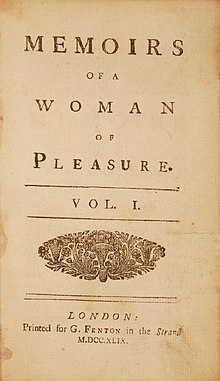Fanny Hill

One of earliest editions, 1749 (MDCCXLIX)
|
|
| Author | John Cleland |
|---|---|
| Original title | Memoirs of a Woman of Pleasure |
| Country | United Kingdom |
| Language | English |
| Genre | Erotic novel |
|
Publication date
|
21 November 1748; February 1749 |
| Media type | Print (Hardback & Paperback) |
| ISBN | |
| OCLC | 13050889 |
| 823/.6 19 | |
| LC Class | PR3348.C65 M45 1985b |
Memoirs of a Woman of Pleasure (popularly known as Fanny Hill) is an erotic novel by English novelist John Cleland first published in London in 1748. Written while the author was in debtors' prison in London, it is considered "the first original English prose pornography, and the first pornography to use the form of the novel". One of the most prosecuted and banned books in history, it has become a synonym for obscenity.
The novel was published in two installments, on 21 November 1748 and February 1749, respectively, by "G. Fenton", actually Fenton Griffiths and his brother Ralph. Initially, there was no governmental reaction to the novel, and it was only in November 1749, a year after the first instalment was published, that Cleland and Ralph Griffiths were arrested and charged with "corrupting the King's subjects." In court, Cleland renounced the novel and it was officially withdrawn.
However, as the book became popular, pirate editions appeared. It was once suspected that the sodomy scene near the end that Fanny witnesses in disgust was an interpolation made for these pirated editions, but as Peter Sabor states in the introduction to the Oxford edition of Memoirs (1985), that scene is present in the first edition (p. xxiii). In the 19th century, copies of the book sold underground in the UK, the US and elsewhere.
The book eventually made its way to the United States. In 1821, in the first known obscenity case in the United States, a Massachusetts court outlawed Fanny Hill. The publisher, Peter Holmes, was convicted for printing a "lewd and obscene" novel. Holmes appealed to the Massachusetts Supreme Court. He claimed that the judge, relying only on the prosecution's description, had not even seen the book. The state Supreme Court wasn't swayed. The Chief Justice wrote that Holmes was "a scandalous and evil disposed person" who had contrived to "debauch and corrupt" the citizens of Massachusetts and "to raise and create in their minds inordinate and lustful desires."
It was not until 1963, after the failure of the British obscenity trial of Lady Chatterley's Lover in 1960 that Mayflower Books, run by Gareth Powell, published an unexpurgated paperback version of Fanny Hill. The police became aware of the 1963 edition a few days before publication, after spotting a sign in the window of the Magic Shop in Tottenham Court Road in London, run by Ralph Gold. An officer went to the shop and bought a copy and delivered it to the Bow Street magistrate Sir Robert Blundell, who issued a search warrant. At the same time, two officers from the vice squad visited Mayflower Books in Vauxhall Bridge Road to determine whether quantities of the book were kept on the premises. They interviewed the publisher, Gareth Powell, and took away the only five copies there. The police returned to the Magic Shop and seized 171 copies of the book, and in December Ralph Gold was summonsed under section 3 of the Obscenity Act. By then, Mayflower had distributed 82,000 copies of the book, but it was Gold rather than Mayflower or Fanny Hill who was being tried, although Mayflower covered the legal costs. The trial took place in February 1964. The defence argued that Fanny Hill was a historical source book and that it was a joyful celebration of normal non-perverted sex—bawdy rather than pornographic. The prosecution countered by stressing one atypical scene involving flagellation, and won. Mayflower decided not to appeal.
...
Wikipedia
